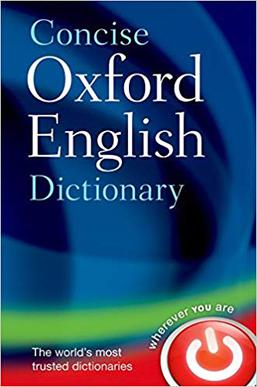
The New Oxford American Dictionary (NOAD) is a single-volume dictionary of American English compiled by American editors at the Oxford University Press.

The Oxford English Dictionary (OED) is the principal historical dictionary of the English language, published by Oxford University Press (OUP), a University of Oxford publishing house. The dictionary, which published its first edition in 1884, traces the historical development of the English language, providing a comprehensive resource to scholars and academic researchers, and provides ongoing descriptions of English language usage in its variations around the world.
Oxford University Press (OUP) is the publishing house of the University of Oxford. It is the largest university press in the world. Its first book was printed in Oxford in 1478, with the Press officially granted the legal right to print books by decree in 1586. It is the second-oldest university press after Cambridge University Press, which was founded in 1534.

A Dictionary of Modern English Usage (1926), by Henry Watson Fowler (1858–1933), is a style guide to British English usage, pronunciation, and writing. Covering topics such as plurals and literary technique, distinctions among like words, and the use of foreign terms, the dictionary became the standard for other style guides to writing in English. Hence, the 1926 first edition remains in print, along with the 1965 second edition, edited by Ernest Gowers, which was reprinted in 1983 and 1987. The 1996 third edition was re-titled as The New Fowler's Modern English Usage, and revised in 2004, was mostly rewritten by Robert W. Burchfield, as a usage dictionary that incorporated corpus linguistics data; and the 2015 fourth edition, revised and re-titled Fowler's Dictionary of Modern English Usage, was edited by Jeremy Butterfield, as a usage dictionary. Informally, readers refer to the style guide and dictionary as Fowler's Modern English Usage, Fowler, and Fowler's.
Webster's Dictionary is any of the US English language dictionaries edited in the early 19th century by Noah Webster (1758–1843), a US lexicographer, as well as numerous related or unrelated dictionaries that have adopted the Webster's name in his honor. "Webster's" has since become a genericized trademark in the United States for US English dictionaries, and is widely used in dictionary titles.
The Oxford Classical Dictionary (OCD) is generally considered "the best one-volume dictionary on antiquity," an encyclopædic work in English consisting of articles relating to classical antiquity and its civilizations. It was first published in 1949, edited by Max Cary with the assistance of H. J. Rose, H. P. Harvey, and Alexander Souter. A second edition followed in 1970 (OCD2), edited by Nicholas G. L. Hammond and H. H. Scullard, and a third edition in 1996 (OCD3), edited by Simon Hornblower and Antony Spawforth. A revised third edition was released in 2003, which is nearly identical to the previous third edition. A fourth edition was published in 2012 (OCD4), edited by Simon Hornblower, Antony Spawforth, and Esther Eidinow. In 2016, a fully digital edition launched online, edited by Sander Goldberg (2013–2017) and Tim Whitmarsh (2018–present). Continuously updated on a monthly basis, this edition incorporates all 6,300 entries from OCD4 as well as newly commissioned entries, and features multimedia content and freely accessible maps of the ancient world.

The Concise Oxford English Dictionary is one of the best-known of the 'smaller' Oxford dictionaries. The latest edition contains over 240,000 entries and 1,728 pages. Its 12th edition, published in 2011, is used by both the United Nations (UN) and NATO as the current authority for spellings in documents in English for international use. It is available as an e-book for a variety of handheld device platforms. In addition to providing information for general use, it documents local variations such as United States and United Kingdom usage.

The Shorter Oxford English Dictionary (SOED) is an English language dictionary published by the Oxford University Press. The SOED is a two-volume abridgement of the twenty-volume Oxford English Dictionary (OED).

The Oxford Advanced Learner's Dictionary (OALD) was the first advanced learner's dictionary of English. It was first published in 1948. It is the largest English-language dictionary from Oxford University Press aimed at a non-native audience.
The Canadian Oxford Dictionary is a dictionary of Canadian English. First published by Oxford University Press Canada in 1998, it became a well-known reference for Canadian English.

Hart's Rules for Compositors and Readers at the University Press, Oxford is a reference book and style guide published in England by Oxford University Press (OUP). Hart's Rules originated as a compilation of best practices and standards by English printer and biographer Horace Hart over almost three decades during his employment at other printing establishments, but they were first printed as a single broadsheet page for in-house use by the OUP in 1893 while Hart's job was controller of the university press. They were originally intended as a concise style guide for the staff of the OUP, but they developed continuously over the years, were published in 1904, and soon gained wider use as a source for authoritative instructions on typesetting style, grammar, punctuation, and usage.

First published in 1918, Kenkyusha’s New Japanese-English Dictionary has long been the largest and most authoritative Japanese-English dictionary. Translators, scholars, and specialists who use the Japanese language affectionately refer to this dictionary as the Green Goddess or GG because of its distinctive dark-green cover.

The Hanyu Da Cidian, also known as the Grand Chinese Dictionary, is the most inclusive available Chinese dictionary. Lexicographically comparable to the Oxford English Dictionary, it has diachronic coverage of the Chinese language, and traces usage over three millennia from Chinese classic texts to modern slang. The chief editor Luo Zhufeng (1911–1996), along with a team of over 300 scholars and lexicographers, started the enormous task of compilation in 1979. Publication of the thirteen volumes began with first volume in 1986 and ended with the appendix and index volume in 1994. In 1994, the dictionary also won the National Book Award of China.

The Longman Dictionary of Contemporary English (LDOCE), first published by Longman in 1978, is an advanced learner's dictionary, providing definitions using a restricted vocabulary, helping non-native English speakers understand meanings easily. It is available in four configurations:

The Collins Robert French Dictionary is a bilingual dictionary of English and French derived from the Collins Word Web, an analytical linguistics database. As well as its primary function as a bilingual dictionary, it also contains usage guides for English and French, English and French verb tables, and maps of English and French speaking areas.
Harrap's Shorter French Dictionary, published by Chambers Harrap Publishers, is one of the best known English/French bilingual dictionaries in the United Kingdom and France. The eighth edition was published in April 2007. In the United States it is sold under the title Harrap's French and English College Dictionary.
The Australian Oxford Dictionary, sometimes abbreviated as AOD, is a dictionary of Australian English published by Oxford University Press.

The Oxford Dictionary of English (ODE) is a single-volume English dictionary published by Oxford University Press, first published in 1998 as The New Oxford Dictionary of English (NODE). The word "new" was dropped from the title with the Second Edition in 2003. The dictionary is not based on the Oxford English Dictionary (OED) – it is a separate dictionary which strives to represent faithfully the current usage of English words. The Revised Second Edition contains 355,000 words, phrases, and definitions, including biographical references and thousands of encyclopaedic entries. The Third Edition was published in August 2010, with some new words, including "vuvuzela".
The Cihai is a large-scale dictionary and encyclopedia of Standard Mandarin Chinese. The Zhonghua Book Company published the first Cihai edition in 1938, and the Shanghai Lexicographical Publishing House revised editions in 1979, 1989, 1999, and 2009. A standard bibliography of Chinese reference works calls the Cihai an "outstanding dictionary".
The Ciyuan or Tz'u-yüan was the first major Chinese dictionary linguistically structured around words instead of individual characters used to write them. The Commercial Press published the first edition Ciyuan in 1915, and reissued it in various formats, including a 1931 supplement, and a fully revised 1979–1984 edition. The latest (3rd) edition was issued in 2015 to commemorate the centenary anniversary of its first publication.











